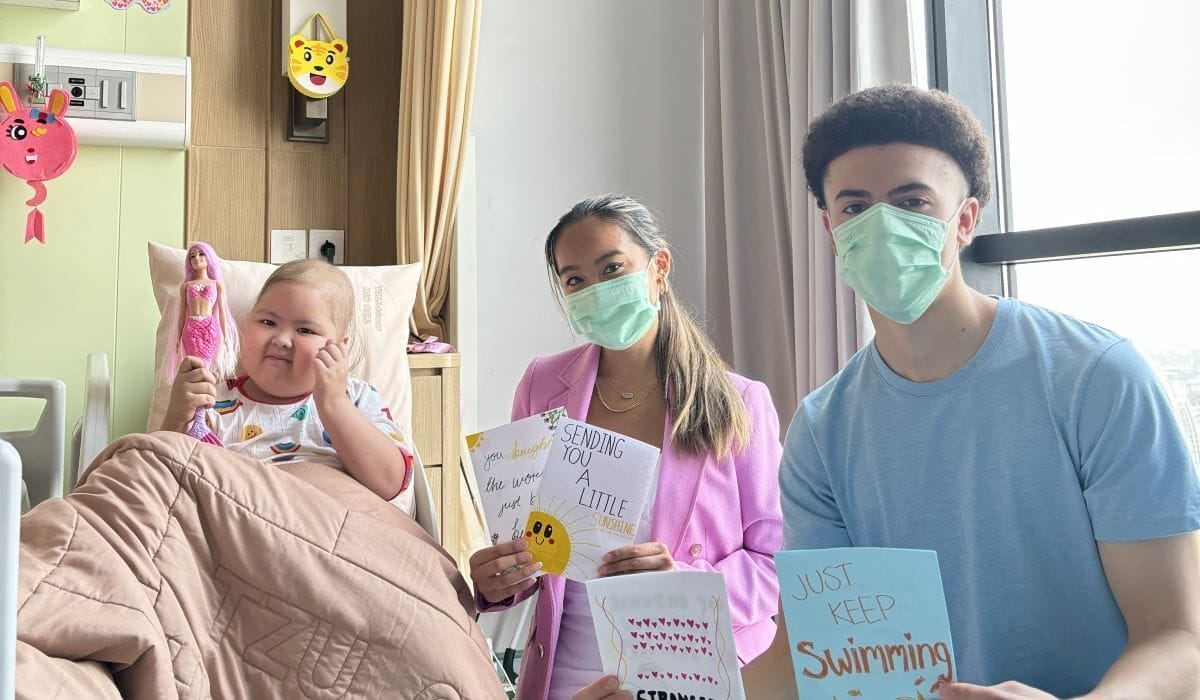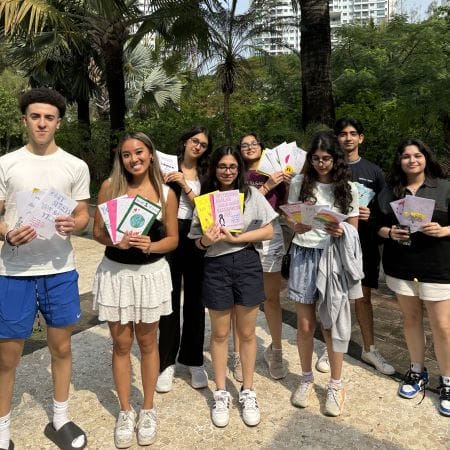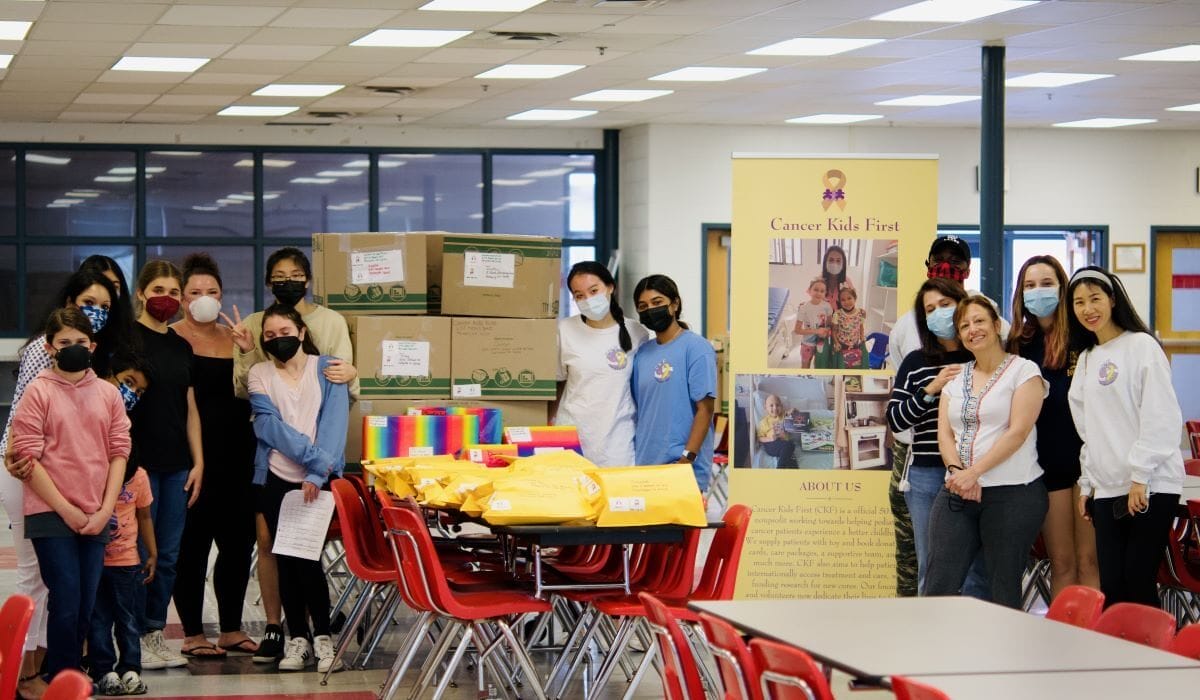Banding Together to Fight Childhood Cancer

Meet Daily Point of Light Award honoree Olivia Zhang. Read her story, and nominate an outstanding volunteer or family as a Daily Point of Light.
You might not expect that Olivia Zhang, a 19-year-old college sophomore studying economics and global health, is the founder and CEO of the world’s largest youth-led cancer organization. But when she speaks, her knowledge and compassion show her to be a highly capable leader.
With a parent whose career was centered on supporting the unhoused, Olivia and her sister learned about nonprofits at a young age, with Olivia’s sister even running social media for some by middle school. In 2019, after multiple loved ones were taken by the disease, Olivia founded Cancer Kids First (CKF). Her goal is to normalize the hospital environment and provide community and support for kids in treatment.
Many of Olivia’s activities both in and outside of school revolve around community service, including her TikTok account where her nonprofit tips and advice have been viewed more than 30 million times and inspire many to get involved. It’s this presence that has helped spur CKF’s growth from a leadership team of three to 30 with 40,000 volunteers across 80 countries. She works with 72 hospitals and 39 businesses. Olivia’s success has also earned her seats on two health boards — WEGO Health and World Child Cancer — where she advises on project development, marketing campaigns and patient leadership opportunities.
What inspires you to volunteer?
My mom is the CFO of a nonprofit. She works with unhoused people. Growing up, she was adamant about making sure my sister and I were giving back to our communities and appreciative of everything that we have. I witnessed how to learn about other people’s stories and best utilize my platform and resources to help others.
I used to sell artwork on Instagram and to my classmates to raise money, because it was a hobby of mine. When I lost two loved ones to cancer, rather than fundraising a few thousand dollars for research hospitals, I wanted to create more of an impact. So, I started Cancer Kids First to honor their legacies of helping children.

Tell us about your volunteer role with Cancer Kids First.
I generally have three to five meetings a week either with our leadership directors to follow up about events and fundraisers we’re planning or with our partners. Then, I run through all our departments. We have many- – service programs, volunteers, events and fundraisers and social media.
I make sure that every month we’re planning a certain number of events and fundraisers, and all our service programs are efficiently helping patients. Sometimes, I’ll create social media posts or plan a calendar for our social media heads to follow.
I also answer emails from partners and coordinate our bigger fundraisers. For instance, this month is Childhood Cancer Awareness Month, and we do an annual fundraiser with Kendra Scott, so I’m the point of contact. In general, if we’re hosting an in-person event, I’m the one organizing the location, coordinating volunteers and leading it.
How do you normalize the hospital environment and build a supportive community for these kids?
We have five service programs. For the Arts program, we create personalized cards and crafts for kids with cancer, including inspiring messages to show support. We deliver entertainment—and medical resources—to the Child Life director at partner hospitals with our Toys and Books program. Items provide normalcy and give patients something to do while getting treatment.
Our Care Packages program provides patients celebrating a milestone like a birthday or finishing chemotherapy with a dream gift shipped directly to them. And our Treatment Services program focuses on increasing access to treatment for international patients by either delivering medical resources or covering transportation costs.
Lastly, our Patient Interaction program aims to decrease isolation by pairing patients with volunteers with similar interests for monthly video calls to talk and play games. The goal of all these programs is to spark some joy and give patients a community of people they can count on.
How did the pandemic affect the organization so soon after you started it?
I was still pretty shy, and securing partnerships and belief in our organization was challenging. The pandemic allowed me to reflect and take online courses on things like how to pitch. I also started focusing on online marketing.
As our membership grew, we got amazing leadership team directors who helped guide us, and I learned the importance of reaching out to your target community to see what they needed most. The pandemic created a lot of new challenges for hospitals that we were able to address, so it opened up a lot of opportunities for us.
What’s been the most rewarding part of your work?
Number one is being able to help patients as young as three years old through something like brain tumors and getting to hear about how we’ve been able to help their families with costs and stress levels. Empowering other young people to be more engaged in community service is also amazing.

What is 51 Forward?
Because of CKF’s growth and my work on social media, I got thousands of messages from young people wanting to build their own nonprofits. I used to post videos or answer DMs directly, but in 2020, I started directly mentoring high school and college students. Through 51 Forward, I’ll meet one-on-one every month with nonprofits to advise on things like marketing strategies and increasing their volunteer base. So far, I’ve worked with 187 leaders in 100 youth-led nonprofits.
Why is it important for others to get involved with causes they care about?
There are so many problems in the world that can be addressed if people are willing to put in the time and energy. And, in general, it’s important to be a global citizen. We’re all on the same earth, so taking care of it is important. Taking care of people facing unjust treatment in our communities is very important. If you have the ability to help someone, why wouldn’t you? If you don’t, who will?
What do you want people to learn from your story?
Don’t be afraid to be authentically yourself and pursue your dreams. Start an organization if you want to. Believe in yourself and take steps to find mentors or learn through books. Hopefully, people are inspired by that say-yes mentality.
Do you want to make a difference in your community like Olivia? Find local volunteer opportunities.
